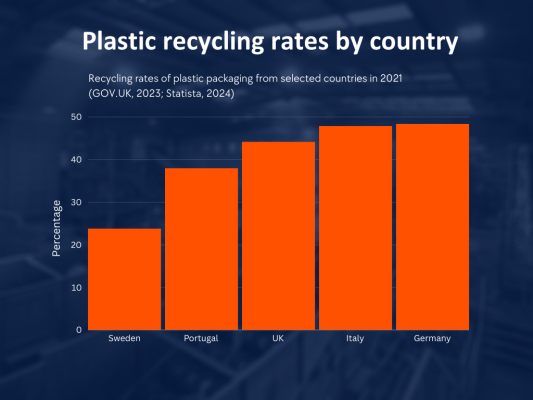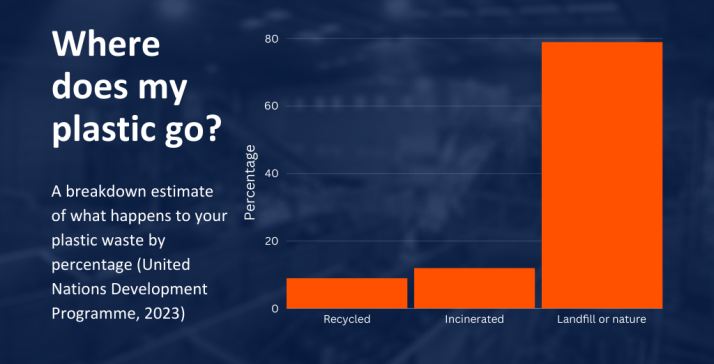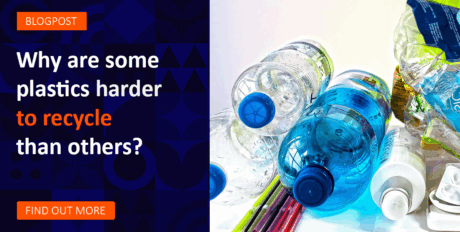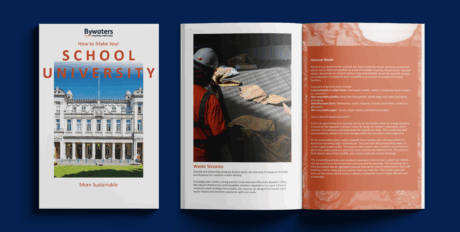Contact us today for your Free Quote
Have you ever returned from your weekly shopping and thought ‘That’s a lot of plastic packaging’? You aren’t alone, and there’s more to this. As a leading London-based recycler, we constantly strive for a more sustainable future. A significant trend we face is the ever-growing production of plastic waste, as well as the need to teach people how to dispose of it correctly.

An official government study from 2021 suggested that the UK produced over 2.5 million tonnes of plastic packaging while recycling around 44.2% of this waste. While recycling plays a crucial role, it’s clear we need to tackle the issue at its source, so why not start being planet-friendly this month by cutting back on plastic?
July is a fantastic time to start cutting back on your plastic habits, as it marks Plastic Free July.
What is Plastic Free July?
Plastic Free July is a month-long campaign dedicated to supporting the plastic-free movement, it encourages people to decrease their plastic usage to help preserve our environment and lower our carbon footprints. With over 85 million participants from over 190 countries in 2023, it’s clear that individuals can make a real difference collectively. We at Bywaters wanted to take part in this global campaign by showing you how to work towards going plastic-free this month and beyond.
Plastic Free July: Some history
Before unpacking our plastic-free tips, we wanted to share a bit about this movement and its history.
How it Started…
The first Plastic Free July began in 2011. It started as a grassroots initiative by Rebecca Prince-Ruiz alongside some acquaintances from the local Western Australian Government.
Despite its humble beginnings, the platform grew to become an award-winning global movement, influencing hundreds of millions of behavioural patterns, as stated in their annual reports. Moreover, their 2023 report states that in the last 5 years, their participants avoided 10 billion kgs of waste, including a staggering 1.4 billion kgs of plastic.
Plastic Free July is now championed by the Plastic Free Foundation Ltd., a non-profit established by Rebecca Prince-Ruiz in 2017. Their core value, ‘small changes add up to a big difference,’ perfectly captures the essence of the movement. It’s a powerful philosophy that dismantles the misconception of individual actions being insignificant.
Plastic Pollution: Why is Plastic Bad?
We all know plastic pollution is bad, but what are the different ways it impacts us? We wanted to revisit some key information and figures to highlight how it impacts our communities and the planet.
Over 99% of plastic is made from chemicals sourced from fossil fuels. Coal, crude oil and natural gas are all classified as fossil fuels. They are made up of petrified, buried remains of plants and animals that existed millions of years ago. When we burn fossil fuels, it produces large quantities of carbon emissions that trap heat in our atmosphere, speeding up global warming.
We use plastic for almost everything. It’s versatile and useful, but unfortunately, overproduction and incorrect disposal cause detrimental effects on our environment. Depending on the type of composition, plastic can take anywhere from 20 to 500 years to decompose. Therefore, many plastics from the start of their production still exist, in some shape or form. As of 2024, over 7 billion tonnes of plastic waste have been generated. Furthermore, nowadays we produce around 400 million tonnes of plastic waste annually.
Roughly less than 10 per cent of that gets recycled. The remaining plastic ends up either in landfills, incinerated or lost to the environment.

The uprising issue of plastic has become so bad it can be found on barren lands, such as Antarctica and 10,975 meters deep in the Mariana Trench – the deepest place known to mankind. Moreover, estimates suggest our oceans are already burdened with 75 to 199 million tonnes of plastic debris.
The abundance of plastic pollution has caused direct and destructive effects on wildlife and even ourselves. When released into our environment, plastic items break down and have been shown to spread throughout our ecosystem. The World Wide Fund suggests that over 100,000 marine animals die every year as a result of plastic pollution. Moreover, a study from the journal Environmental Science and Technology states humans may be consuming anywhere from 39,000 to 52,000 microplastic particles a year.
Furthermore, a potentially concerning link has emerged between microplastics and cardiovascular health. A recent study suggests the presence of these tiny plastic particles in the blood vessels may double the risk of stroke or heart attack for certain individuals.
Plastic Legislation
However, it’s not all doom and gloom, as many countries have introduced several policies to tackle plastic pollution. For example, plastic bag bans have been present in several countries in recent years, with countries such as Kenya and Rwanda having notably rigorous legislation for this. Moreover, the EU has implemented restrictions on single-use plastic products such as plates, cutlery, straws, balloon sticks and cotton buds. In addition, the UK’s supermarket plastic bag charge, introduced in 2015, has dramatically reduced plastic carrier bag use from seven leading grocery chains, cutting it by 98%.
Cutting Back on Plastic Habits
While it is great to see some major pivots against single-use plastics, it is going to take some time before legislation will comprehensively tackle plastic pollution, so we must make changes to our daily habits today to tackle this matter together. After all, this is what Plastic Free July is all about.
How to Reduce Plastic Waste?
Buy Plastic-Free Products
Finding alternatives made with less plastic to everyday products such as straws and packaging is becoming easier. For example, our partner, Stroodles, is combating single-use plastic by producing 100% edible biodegradable cutlery made out of wheat, with no compromise to the eating and drinking experience. Big-name brands are also becoming more environmentally conscious. For example, Colgate has produced a toothbrush handle made with natural, biodegradable bamboo and free from plastic packaging. An excellent purchase if you are looking to go plastic-free.
What Can I Recycle? Check Twice Before Recycling
While this can also apply to non-plastic products, we thought that it was worth sharing with you an important principle in recycling that is relevant to going plastic-free: Make sure your item is not made of composite materials. In other words, items that are made of a single material are easier to recycle than items made of several.
That being said, there are quite a few items we use every day that claim to be recyclable but aren’t that environmentally friendly.
Coffee cups are a great example, as they are often coated with plastic inside. Although the amount of plastic is roughly just 5%, it becomes difficult to separate the two components. This item is so notoriously difficult to recycle, that it often requires its own waste stream to handle it sustainably.
While coffee cups may be a popular example, many other items often may appear easily recyclable but aren’t due to their ‘hidden’ plastic components. These may include drink cartons, many envelopes, wet wipes… So if you’re unsure, it is best to check twice before putting something in the recycling bin.
Reuse with the Waste Hierarchy
The most sustainable way to avoid plastic, apart from not using it completely, is to reuse what you already have. For example, instead of buying bottled water, use a reusable bottle. As mentioned earlier, most coffee cups from coffee chains contain a plastic coating. So instead of their cups, bring your reusable cup. According to numerous sources, if one person uses reusable bags over their lifetime, it would remove more than 22,000 plastic bags from the environment. Reusing your daily items will help save time, money, energy and resources.
This piece of advice is in line with the principles of the Waste Hierarchy. Check out our article on the framework to find out more.
Buy Loose Produce
Many supermarkets now have large bins of loose fruits and vegetables, enabling you to toss fresh produce into your shopping basket avoiding the endless consumption of plastic wrapping. Of course, supermarkets are not the only place you can buy plastic-free produce. Check with your local fruit and vegetable market and support local businesses while avoiding extra packaging.
Resin Identification Code – Think About its Recyclability
Let’s face it, going plastic-free is a challenge. It’s everywhere. Having said this, if you have no choice but to consume plastic in some way, you can still check whether the plastic item you’re posed with is easy to recycle or not.
Have you ever noticed how most plastic materials have a recycling symbol with a number in the middle? That is called a Resin Identification Code (RIC), it helps to identify what type of material the item is made of. By using this code, we can identify both the plastic component and its recyclability. For example, 1 PETE (Polyethylene terephthalate) is what plastic bottles are made of, and they’re widely recycled. On the other hand, 6 PS (Polystyrene) is what plastic takeaway containers are often made of, and this type of plastic is harder to recycle.
To help you understand how all these symbols work, we at Bywaters published our Plastic Guide in our Resource Library, this serves to help you understand how to deal with plastic recycling and these symbols.
You Made it This Far…
We hope you found this article for Plastic Free July useful. By incorporating these simple changes into your routine, you can make a significant difference. Remember, every small change adds up. Let’s keep the momentum going and encourage others to join in, creating a plastic-free future.
That being said, Bywaters is a sustainable recycler who works with its clients on sustainability strategies to encourage its stakeholders to adopt more planet-friendly habits. From state-of-the-art recycling equipment to bespoke engagement sessions, our services provide a wide array of services to ensure our customers reach their sustainability goals. If you would like to find out more, contact us today.
More posts:
Valentine’s Day: History, Tradition, and Its Modern Impact
This post traces the evolution of Valentine’s Day from ancient Roman rituals to a global commercial event. It highlights the holiday’s hidden environmental impact and offers a guide to celebrating sustainably through “Circular Romance” and waste reduction.
Read morePlastic Recycling: Why Are Some Types Harder to Process Than Others?
Some plastics recycle easily, while others are difficult or impractical to process at scale. This article explains why material type, packaging design, contamination and recycling infrastructure all play a role, and what businesses can do to improve plastic recycling outcomes in the UK.
Read moreThe Ultimate Guide For a Sustainable School and University
Download The Ultimate Guide For a Sustainable School or University. Get the roadmap to cut costs, reduce your carbon footprint, and boost your ESG profile with 5 core pillars.
Read more




